Health screening is a vital aspect of preventive healthcare, helping individuals identify potential health risks and detect diseases early—even before symptoms appear. In Singapore, where healthcare infrastructure is world-renowned for its efficiency and quality, health screening has become increasingly accessible and tailored to individual needs. This article explores the importance, types, and availability of Health Screening in Singapore, along with practical advice on how to get started.
Why Health Screening Matters
Health screening plays a crucial role in the early detection and management of both chronic and acute health conditions. Commonly screened diseases in Singapore include diabetes, hypertension, high cholesterol, various types of cancer (such as colorectal, breast, and cervical), and infectious diseases like hepatitis B.
By detecting these issues early, individuals can:
- Begin timely treatment and avoid complications.
- Make informed lifestyle changes.
- Reduce long-term healthcare costs.
- Improve their quality of life and longevity.
Singapore’s Ministry of Health (MOH) promotes regular health screening through national programs such as Screen for Life, which offers subsidised screenings to eligible Singaporeans and Permanent Residents.
Types of Health Screening Available in Singapore
1. Basic Health Screening
Ideal for individuals with no symptoms or existing health conditions, basic health screening typically includes:
- Blood pressure measurement
- Body Mass Index (BMI) assessment
- Blood glucose level test
- Cholesterol level test (lipid profile)
- Urinalysis
2. Comprehensive Health Screening
These packages are more detailed and cater to individuals over 40 or those with risk factors (e.g., family history of chronic illness). Tests may include:
- Full blood count
- Liver function test
- Kidney function test
- Electrocardiogram (ECG)
- Chest X-ray
- Ultrasound (abdomen, thyroid, etc.)
- Cancer markers
3. Specialised Screenings
Some screenings target specific diseases or demographics:
- Women’s Health Screening: Includes mammograms, Pap smears, pelvic ultrasounds.
- Men’s Health Screening: Includes prostate-specific antigen (PSA) testing and testosterone levels.
- Cardiac Screening: For those at risk of cardiovascular disease, includes stress tests and echocardiograms.
- Genetic Screening: Tests for inherited conditions, especially useful for family planning or managing inherited diseases.
Where to Go for Health Screening in Singapore
Singapore offers a wide array of public and private health screening providers:
1. Public Healthcare Institutions
Subsidised screening services are available at:
- Polyclinics
- Government hospitals (e.g., SGH, Tan Tock Seng Hospital)
- Community Health Assist Scheme (CHAS) clinics
The Screen for Life program, supported by the Health Promotion Board (HPB), makes these screenings affordable and accessible.
2. Private Clinics and Hospitals
For faster appointments and more personalized services, private clinics and hospitals offer premium screening packages. Popular providers include:
- Raffles Medical Group
- Parkway Shenton
- Fullerton Health
- Healthway Medical
- Mount Elizabeth Hospitals
Some clinics even offer executive health screening packages, complete with follow-up consultations and lifestyle coaching.
Frequency of Health Screening
The frequency of health screening depends on age, gender, and medical history. General recommendations include:
| Age Group | Recommended Screening | Frequency |
| 18–39 | BMI, Blood Pressure, Cholesterol | Every 1–2 years |
| 40–49 | All of the above + Diabetes, Colorectal Cancer (if risk factors) | Every 1–2 years |
| 50+ | All of the above + Mammograms (women), PSA (men), Bone Density | Annually |
Always consult a healthcare professional to determine the appropriate screening schedule for your personal risk profile.
Cost of Health Screening in Singapore
The cost varies widely based on the type of tests and the provider. As a general guide:
- Basic packages: S$50 – S$150
- Comprehensive packages: S$300 – S$1,000+
- Specialised tests: Vary depending on the complexity (e.g., genetic tests can exceed S$1,500)
The Screen for Life program offers screenings at subsidised rates—often as low as S$0–S$5 for eligible citizens.
Health Screening for Foreigners in Singapore
Expats and long-term visitors also have easy access to health screening in Singapore. Many private clinics offer tailored packages for foreigners, often with insurance claim support and multilingual staff. It is advisable to check with your insurance provider on coverage for health screening.
Preparing for Your Screening
To ensure accurate results, consider the following:
- Fasting: Avoid food and drinks (except water) 8–10 hours before blood tests.
- Medications: Inform your doctor about any medication you're on.
- Clothing: Wear comfortable clothing, especially for ECG or ultrasound.
- Medical history: Bring relevant medical documents or prior test results.
What Happens After the Screening?
After your tests:
- You’ll receive a detailed report of your results.
- A doctor will interpret your results and advise on next steps.
- If abnormalities are detected, you may be referred for further tests or a specialist.
It's important to follow up on your results—even if everything seems normal—to maintain long-term health.
Promoting a Culture of Preventive Health
Singapore is steadily moving toward a "Healthier SG" model, emphasizing preventive care over curative care. Encouraging regular health screening is a cornerstone of this approach. By participating in health screening, individuals not only protect their own well-being but also contribute to a healthier, more resilient society.
Final Thoughts
Health screening in Singapore is a well-structured, accessible, and essential part of maintaining a healthy life. Whether you're a young adult starting your career, a parent balancing family and work, or a senior citizen enjoying retirement, regular screenings can empower you to take charge of your health.
Take the first step—schedule your health screening today. Your future self will thank you.

